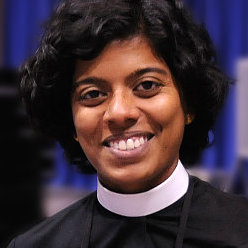
I’ve just come from four weeks in India visiting seminaries and churches and participating in what is billed as the longest procession in Asia for the Nativity of Mary. They prepared for 3 million people this year. In the Church of South India women’s ordination has been allowed since 1947, and yet, there are still dioceses that have no woman priests. I was in one diocese that used to have a few women priests, but because of lack of job opportunities I was told, there are now none. The first woman bishop was only elected in 2013.
The fast and feast for Mary, the one with the long procession, is a fast of women. There are men there, but it is overwhelmingly women, women of all religious traditions, who come to pray to Mary for special intentions. I was struck by how not unusual that is, to be in a church space that is predominantly women, a space in which women support one another, run most things, but one in which only men exercise public, ordained leadership. This is not to downplay the importance of lay men and women who are the vast majority of the Christians on this planet, but rather to remind us that the movement towards equality is not inevitable. Legislation is not the end of the struggle.
For all of the many important issues of social justice that are women’s issues, in the church, the full and equal participation of women in ordained leadership is important, and one we cannot lose sight of. There is no guarantee that women will be elected or moved forward into key leadership roles if we are not vigilant and clear that gender equality must be a primary value of a church that seeks to follow Jesus.
Deputy Winnie Varghese is director of justice and reconciliation at Trinity Church Wall Street in New York.


